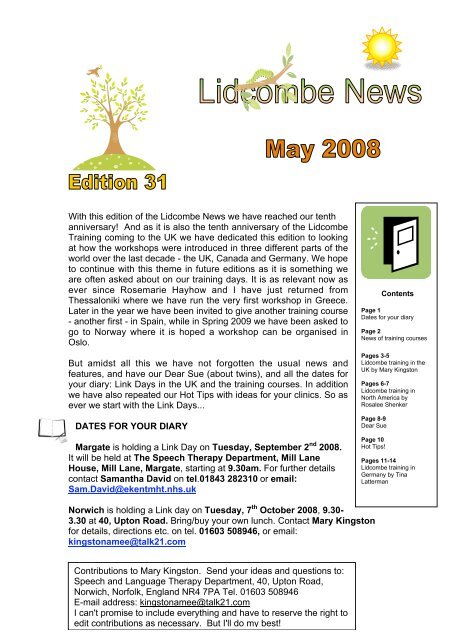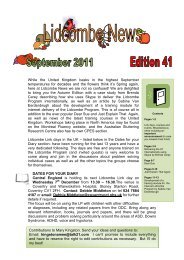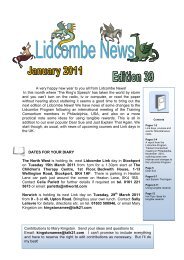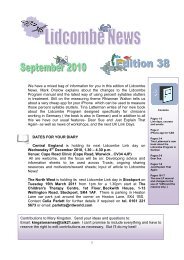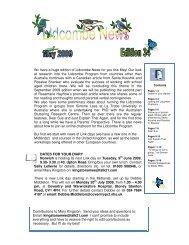Lidcombe News Edition 31st - Montreal Fluency
Lidcombe News Edition 31st - Montreal Fluency
Lidcombe News Edition 31st - Montreal Fluency
Create successful ePaper yourself
Turn your PDF publications into a flip-book with our unique Google optimized e-Paper software.
With this edition of the <strong>Lidcombe</strong> <strong>News</strong> we have reached our tenth<br />
anniversary! And as it is also the tenth anniversary of the <strong>Lidcombe</strong><br />
Training coming to the UK we have dedicated this edition to looking<br />
at how the workshops were introduced in three different parts of the<br />
world over the last decade - the UK, Canada and Germany. We hope<br />
to continue with this theme in future editions as it is something we<br />
are often asked about on our training days. It is as relevant now as<br />
ever since Rosemarie Hayhow and I have just returned from<br />
Thessaloniki where we have run the very first workshop in Greece.<br />
Later in the year we have been invited to give another training course<br />
- another first - in Spain, while in Spring 2009 we have been asked to<br />
go to Norway where it is hoped a workshop can be organised in<br />
Oslo.<br />
But amidst all this we have not forgotten the usual news and<br />
features, and have our Dear Sue (about twins), and all the dates for<br />
your diary: Link Days in the UK and the training courses. In addition<br />
we have also repeated our Hot Tips with ideas for your clinics. So as<br />
ever we start with the Link Days...<br />
DATES FOR YOUR DIARY<br />
Margate is holding a Link Day on Tuesday, September 2 nd 2008.<br />
It will be held at The Speech Therapy Department, Mill Lane<br />
House, Mill Lane, Margate, starting at 9.30am. For further details<br />
contact Samantha David on tel.01843 282310 or email:<br />
Sam.David@ekentmht.nhs.uk<br />
Contents<br />
Page 1<br />
Dates for your diary<br />
Page 2<br />
<strong>News</strong> of training courses<br />
Pages 3-5<br />
<strong>Lidcombe</strong> training in the<br />
UK by Mary Kingston<br />
Pages 6-7<br />
<strong>Lidcombe</strong> training in<br />
North America by<br />
Rosalee Shenker<br />
Page 8-9<br />
Dear Sue<br />
Page 10<br />
Hot Tips!<br />
Pages 11-14<br />
<strong>Lidcombe</strong> training in<br />
Germany by Tina<br />
Latterman<br />
Norwich is holding a Link day on Tuesday, 7 th October 2008, 9.30-<br />
3.30 at 40, Upton Road. Bring/buy your own lunch. Contact Mary Kingston<br />
for details, directions etc. on tel. 01603 508946, or email:<br />
kingstonamee@talk21.com<br />
Contributions to Mary Kingston. Send your ideas and questions to:<br />
Speech and Language Therapy Department, 40, Upton Road,<br />
Norwich, Norfolk, England NR4 7PA Tel. 01603 508946<br />
1<br />
E-mail address: kingstonamee@talk21.com<br />
I can't promise to include everything and have to reserve the right to<br />
edit contributions as necessary. But I'll do my best!
The <strong>Lidcombe</strong> Link Day for the North West is on Tuesday 7th October: 1.00<br />
for a 1.30 start. It will be held at Handforth Clinic, Wilmslow Road, Handforth,<br />
Wilmslow, Cheshire, SK9 3HL. We will be discussing tricky cases and a<br />
journal article. For further information, please email:<br />
Louise.Tweedie@echeshire-tr.nwest.nhs.uk or tel. 01625 661983<br />
COURSES AND EVENTS<br />
There are several courses being run in the UK this year but they are<br />
not all open to people outside the departments running them, or else<br />
they are already full. I am therefore only in a position to advertise those<br />
departmentally based ones that still have places to sell, and the national ones.<br />
The next course advertising places is in SE London. It is being held at<br />
Catford on Monday and Tuesday, July 28 th and 29 th 2008, hosted by<br />
Lewisham Children and Young People's SLT Service. For further information<br />
contact Dorett Davis on email: dorett.davis@lewishampct.nhs.uk Tel. 020<br />
7138 1385. The workshop is being presented by Rosemarie Hayhow and<br />
Mary Kingston.<br />
Norwich is holding its annual national workshop on Monday and Tuesday,<br />
October 13 th and 14 th 2008, at the Assembly Rooms, in the centre of the city.<br />
Contact Sally Wynne on email: robertsallywynne@boltblue.com for a flyer<br />
or telephone 01603 425241 if you wish to speak to her personally. The course<br />
is being presented by Mary Kingston and Sally Wynne.<br />
Apart from this, and a workshop in Spain to be presented by Rosemarie<br />
Hayhow and Mary Kingston in October 2008, there is nothing definite until<br />
March 2009 when the annual national training course in London will once<br />
again be held at the Royal College of Speech and Language Therapists. No<br />
dates have as yet been fixed but do contact Sally Wynne on<br />
robertsallywynne@boltblue.com if you would like the flyer when it comes<br />
out.<br />
2
This is the first of three articles in this edition of <strong>Lidcombe</strong> <strong>News</strong> which will be<br />
looking at the introduction of <strong>Lidcombe</strong> Training workshops over the last ten<br />
years. We will start with the UK as we have the longest record of<br />
these training courses and this year heralds our tenth<br />
anniversary.<br />
The Introduction of <strong>Lidcombe</strong> training in the United<br />
Kingdom - some reflections<br />
By Mary Kingston, Norfolk Community Healthcare<br />
It hardly seems possible that it is twelve years (1996) since<br />
Mark Onslow and Sue O’Brian made their whistle stop tour of<br />
the United Kingdom to present the new and radical approach<br />
to the treatment of young children who stutter known as the<br />
<strong>Lidcombe</strong> Program (LP). I attended one of their sessions- in<br />
Wolverhampton- and knew at once that I had found something for which I had<br />
been looking for some time. I had long wanted a way of working directly with a<br />
child’s speech but without teaching a novel speech pattern, had wanted to<br />
involve and empower the parents and the children themselves, and had also<br />
felt the need for some measures of outcome. Others however were not so<br />
sure and a healthy debate ensued around what was the safest and most<br />
correct way to treat pre-schoolers who stuttered. Some of these concerns<br />
which were published the following year are discussed in the European<br />
Journal of Disorders of Communication (1997) and give a flavour of the<br />
thinking at that time. I for my part set about finding a way to get myself<br />
trained and, following a business plan, which with the help of my department<br />
head we presented to my health Trust in Norfolk, I was eventually granted<br />
funds to go to Australia. The reason the health service was prepared to fund<br />
me, I discovered, was that the research already carried out on the programme<br />
was of such a high standard that the Trust was prepared to take the risk with<br />
public funds and send me on my way.<br />
I was not, I soon realised, the only one interested enough in this programme<br />
to want to make the trip. Rosemarie Hayhow had attended a full day course<br />
that Mark and Sue ran in Bristol. This gave her a good enough understanding<br />
of the approach to use it with two five year old children who had previously<br />
received indirect therapy but continued to stutter. It worked very well for these<br />
children and so Rosemarie applied for a British Telecom bursary to visit<br />
Australia and learn more about the LP. Rebecca Pitt (now Ledzion) from<br />
London was also keen to receive the training. I found that Rosemarie and I<br />
has similar reasons for wanting some additional methods of treating stuttering,<br />
and that Rebecca, being Australian herself and having some previous<br />
experience of the LP, was equally like-minded in this respect. The story of our<br />
time there has been documented in the British Stammering Association’s<br />
magazine “Speaking Out” (1997).<br />
On our return we all implemented the LP in our clinics, with much success,<br />
and as we found there was a demand for training from other UK clinicians we<br />
invited Sue O’Brian over to London, Norwich and Bristol, to run three training<br />
courses in January 1998.As the LP was still being fiercely (and emotionally)<br />
debated over here, Sue must have felt she was entering the lion’s den...but<br />
3
the courses went down well with the majority (though not all and there are still<br />
many who remain sceptical) of the thirty or so clinicians, and soon a demand<br />
for more training was evident. Around this time the <strong>Lidcombe</strong> <strong>News</strong> was born<br />
(May 1998, see <strong>Lidcombe</strong> <strong>News</strong> edition 12 for a brief history) and it was Sue<br />
O’Brian who was our first agony aunt, though the ‘Dear Sue’ position in this<br />
newsletter has now for many years been taken over by the Bankstown<br />
Stuttering Unit with Lis Harrison, Vanessa Harris and now Margaret Webber<br />
heading up the team.<br />
As Sue could not keep coming over to the UK to deliver the workshops, this<br />
role was handed over to Rosemarie, Rebecca and myself. Initially the courses<br />
were spread over five or six days- this included a follow up day- and when<br />
they were given at the clinic bases of the three trainers they also included<br />
some ‘live’ observation of children being treated. During this time the<br />
popularity of the courses increased and soon the demands on our time, as<br />
well as the expense of the course to the health service, meant that we had to<br />
reduce the number of training days to three with one follow up day. The<br />
publication of the hardback book ‘the Clinician’s Guide’ in 2003, the formation<br />
of the <strong>Lidcombe</strong> Program Trainers Consortium, and the development of<br />
excellent videos and workbooks from Australia, have ensured a presentation<br />
which is the same worldwide. The quality of these resources, the local<br />
support networks and a greater acceptance that direct treatment can benefit<br />
young children who stutter, has led to our reducing the workshops to two days<br />
in English speaking countries and three days in countries where English is not<br />
the first language.<br />
Since those early workshops we have noticed a change in feeling about the<br />
LP. They are no longer the challenge, or as exhausting, as they once were!<br />
For the most part therapists have accepted that the LP is another way of<br />
treating early stuttering, and new graduates who have learned about it at<br />
university now view it as an appropriate intervention for children at risk of<br />
persistent stuttering. Most of the health Trusts in the UK have someone who<br />
has been <strong>Lidcombe</strong> trained and it is expected that clinical leads in stuttering in<br />
Speech and Language Therapy departments should have the <strong>Lidcombe</strong><br />
training under their belts. Some may favour the indirect approach as their first<br />
choice, others may prefer the LP, but both are now seen as mainstream<br />
therapy in the UK, with the LP having the huge advantage of a strong<br />
evidence base which makes it easier to access funding for training. I am<br />
sometimes asked how many clinicians we have trained over the years in the<br />
UK and I’m afraid I don’t have any figures for this, but a guestimate would be<br />
around 2000.<br />
The story of the training in this country does not stop with the UK. We have<br />
been called upon to train therapists in other countries- most particularly in<br />
Ireland, the Netherlands, Sweden and Denmark. The Netherlands has its own<br />
Consortium member- Durdana Putker (email:durdana.putker@planet.nl)<br />
and until recently so did Denmark. Lone Cordes Felby, unfortunately for us,<br />
moved on to a new job so this position is now open to a new member. This<br />
year we have had the privilege of travelling to Greece to train some twenty<br />
five therapists and in the autumn we have been invited to Spain to run a<br />
workshop there. Norway is currently advertising its own course which should<br />
take place in April 2009, and we have also had enquiries from Italy.<br />
4
I mentioned earlier in this article that it was the research which had persuaded<br />
my health Trust to fund my trip to Australia. During the eleven years since we<br />
have implemented the LP in this country, Rosemarie and I who are now the<br />
two UK Trainers for the Consortium, have added to that evidence base.<br />
Initially I ran an audit in Norfolk, which is unpublished, but many of the results<br />
appear in the Bulletin of the Royal College of Speech and Language<br />
Therapists (1999). It was important in that, as Mark Onslow informed me at<br />
the time, it was the first occasion that the Australian results had been<br />
replicated in a different country, and in a different culture. Rosemarie too ran<br />
an audit, which was national, and is summarised in <strong>Lidcombe</strong> <strong>News</strong> edition 15<br />
(January 2003) and is available from the www.montrealfluency.com under the<br />
<strong>Lidcombe</strong> <strong>News</strong>letters section. We will have a look at some further research<br />
which has been conducted in this country, including Rosemarie’s Ph.D, and<br />
some other studies which are not based in Australia, in a later edition of the<br />
<strong>Lidcombe</strong> <strong>News</strong>.<br />
So we continue with the <strong>Lidcombe</strong> Training as it proliferates throughout the<br />
world, offering support where we can through <strong>Lidcombe</strong> Link days in the UK,<br />
the <strong>Lidcombe</strong> <strong>News</strong>, and problem solving by email with individual therapists<br />
who write to us. When I drove to Wolverhampton all those years ago I had<br />
little idea of how that day would change my clinical practice, or indeed my life,<br />
nor how it would help to spread the <strong>Lidcombe</strong> Program throughout the UK and<br />
Europe. Rosemarie and I, and other colleagues who help us co-present the<br />
training, Sally Wynne, Polly Mitchell, Corinne Moffatt and Samantha David,<br />
will, we hope, to continue to work and learn together, offering workshops<br />
where they are requested in the future.<br />
My grateful thanks to Rosemarie Hayhow for her help with this article<br />
References<br />
Hayhow, R. & Enderby, P. (2001) An audit of Speech and Language<br />
Therapists’ use of the <strong>Lidcombe</strong> Program. Unpublished manuscript, Speech<br />
and Language Therapy Research Unit, Frenchay Hospital, Bristol, UK<br />
Kingston, M. (1999, December). Is stuttering a motor speech problem?<br />
Bulletin of the Royal College of Speech and Language Therapists, pp. 9-11<br />
Kingston, M. (1997) The <strong>Lidcombe</strong> Programme comes to Britain. The British<br />
Stammering Association: Speaking Out, Autumn edition<br />
Onslow, M., Packman, A., & Harrison, E. (2003). The <strong>Lidcombe</strong> Program of<br />
Early Stuttering Intervention. Austin, TX: Pro-Ed.<br />
Onslow, M., O’Brian, S. & Harrison, E. (1997). The <strong>Lidcombe</strong> Program of<br />
Early Stuttering Intervention: Methods and Issues. European Journal of<br />
Disorders of Communication, 32, 231-250<br />
Rustin, L. & Cook, F. (1997). Commentary on the <strong>Lidcombe</strong> Program of Early<br />
Stuttering Intervention. . European Journal of Disorders of Communication,<br />
32, 250-258<br />
5
A brief history of the <strong>Lidcombe</strong> Program<br />
Clinician Training in North America:<br />
Looking Back at 10 Years<br />
Rosalee C. Shenker<br />
I first heard Mark Onslow speak about the <strong>Lidcombe</strong> Program at an ASHA<br />
Special Interest Division 4 meeting in Monterey, California, in 1997. Although<br />
I had read a bit about the <strong>Lidcombe</strong> Program I was unprepared for the effect<br />
that this presentation had on me. All of the components of the treatment and<br />
rationale for the approach suddenly made perfect sense and I remember<br />
thinking, “Why haven’t I thought of that!” After pursuing Mark as an email<br />
‘pen pal’ for several months, we arranged that he and Ann Packman would<br />
visit <strong>Montreal</strong> in November 1997. Their plane landed on the first snowy day of<br />
the season and although it looked beautiful from inside the airport, it was not<br />
so easily navigable for a couple from ‘Oz’ who had not had the experience of<br />
walking in ‘slush’ without proper footwear. “Oh, oh”, I thought, “…bad start!”<br />
However, from the first meeting, I was committed to the concept of the<br />
<strong>Lidcombe</strong> program, and determined to try it out in Canada. The support and<br />
mentoring that I and my colleagues have received from all the members of the<br />
ASRC over the years has been exceptional. After several months of clinical<br />
practice, and after convincing several staff clinicians and graduate students to<br />
try out this ‘new approach’, Mark returned again in November 1998 to follow<br />
up on our progress. We presented several cases with great trepidation, and<br />
found Mark to be an excellent clinical teacher, providing supportive and useful<br />
feedback that further encouraged us to shape our clinical skills in those early<br />
days. Our initial fears of presenting in front of the ‘developer of the LP’ were<br />
totally unfounded, we breathed a collective sigh of relief and became even<br />
more determined to help other Speech Language Pathologists, (SLP) to learn<br />
to use this effective program. At that meeting I agreed to initiate clinical<br />
training in the <strong>Lidcombe</strong> Program in Canada.<br />
The first <strong>Lidcombe</strong> Program Clinical Training workshop in Canada took place<br />
in March 1999 when Elisabeth Harrison travelled to <strong>Montreal</strong> to train 30 SLPs.<br />
Two of those clinicians were Melissa Bruce and Julie Reville, clinical<br />
coordinators for student training at the University of Vermont. At the time of<br />
initial training, North American clinicians were more familiar, and therefore<br />
more comfortable, with more indirect models of early intervention. Although<br />
many North American clinicians quickly embraced the <strong>Lidcombe</strong> Program, it<br />
was still difficult for some to embrace a model that provided direct verbal<br />
feedback for stuttering to the child. I shall ever be indebted to Barry Guitar<br />
for his openness and willingness to try out this program. After seeing the<br />
progress made by Melissa and Julie with the <strong>Lidcombe</strong> Program, Barry<br />
registered for the first <strong>Lidcombe</strong> Program workshop given by myself and<br />
JoAnne Wilding. Imagine our excitement…and anxiety… to have Barry as<br />
one of our students. We need not have been concerned; he was a perfect<br />
gentleman and enhanced the workshop through sharing his clinical expertise<br />
and experience which included stories of his time spent in Australia working<br />
with Dr. Gavin Andrews. By 2002 over 250 clinicians had been trained, mostly<br />
6
in Canadian based workshops, and the <strong>Lidcombe</strong> Program was quickly<br />
becoming best practice for the treatment of preschool age children. The early<br />
model included a ‘problem solving day’ where clinicians returned to present<br />
their own cases for group feedback and mentoring. This was replaced by<br />
individual clinic initiatives as, more and more, we noted that whole clinics with<br />
<strong>Lidcombe</strong> Program trained SLPs were getting together regularly for ‘pizza and<br />
<strong>Lidcombe</strong>’.<br />
After 2002, the workshop schedule began to include American cities. The first<br />
American workshop took place at the University of Louisiana at Lafayette in<br />
2003. This workshop included clinicians from Louisiana and surrounding<br />
states. By 2004 there were 8 workshops scheduled, and for the first time<br />
more of them took place in the USA in sites that included Maryland, Oregon,<br />
Vermont, California, New York and Ohio. Soon after, the <strong>Lidcombe</strong> Program<br />
Training Consortium was formed and I, JoAnne Wilding, Barry Guitar, Melissa<br />
Bruce and Julie Reville became charter members in North America.<br />
As I write, more than 2,000 Speech Language Pathologists have been<br />
trained in North American workshops provided by the LPTC members. While<br />
there continues to be a ‘mild resistance’ to the program in North America, it<br />
appears to be the choice of clinicians, who have often been introduced to the<br />
program by parents who have heard about the <strong>Lidcombe</strong> Program and are<br />
searching for a ‘trained clinician’. The <strong>Montreal</strong> <strong>Fluency</strong> Centre maintains a<br />
referral list for clinicians trained in LPTC workshops on its website at<br />
www.montrealfluency.com<br />
In 2006, Judy Kuster, who provides us with the wonderful Stuttering<br />
Homepage, graciously offered to set up a chat room for the <strong>Lidcombe</strong><br />
Program. This was organized as a response to clinicians who requested online<br />
mentoring and troubleshooting feedback following their training. This chat<br />
line is reserved for those clinicians who have received training in the LP and<br />
you can request an invitation by writing to Kristy at<br />
lidcombe@montrealfluency.com<br />
Since that first meeting in Monterey I have never looked back, and never once<br />
regretted the decision to use the <strong>Lidcombe</strong> Program. In our follow up<br />
assessments of children who have been discharged from the program we find<br />
that the great majority of the children who we have contacted have maintained<br />
their fluency after periods of up to 8 years following discharge from Stage 2.<br />
As we enter the second decade of providing <strong>Lidcombe</strong> Program treatment,<br />
workshops and support systems we are looking ahead to the future. We are<br />
always supported by visits from Australian colleagues and with<br />
helpful/encouraging feedback for our projects. The <strong>Montreal</strong> <strong>Fluency</strong> Centre<br />
has become one of the models for evidence-based clinical practice in North<br />
America. Look for the next chapter to this story in future editions of the<br />
newsletter.<br />
7
Dear Sue,<br />
I have a family who came to see me with twins who both<br />
stutter. They are both boys, aged 4years 2m, and have<br />
similar types and severity of stuttering. I know I will need to<br />
see them both but am unsure how to proceed.<br />
Should I see them simultaneously or consecutively?<br />
If I see them simultaneously should the mother and I be working with<br />
them individually or could I see them together, as a little group?<br />
What in your experience have you found to be the better system and<br />
why?<br />
I am presuming that immediate treatment for both boys using the<br />
<strong>Lidcombe</strong> Program (LP) is preferred. There might be a number of options<br />
that the clinician could consider, along with the parent, but whatever is<br />
decided it will be essential to determine quickly whether the approach is<br />
working, and if not what changes to make. The obvious pitfall would be<br />
that in trying to be time efficient neither boy receives appropriate<br />
therapy.<br />
Start as usual by discussing with the parent what is needed for the LP to<br />
work. This would include:<br />
• measurement for both children<br />
• sufficient effective therapy at home to achieve the desired change<br />
for both children<br />
• sufficient clinic time to allow appropriate teaching and checking of<br />
progress in relation to both the children etc.<br />
With this knowledge and that of their home situation the parent may<br />
well have an initial preferred, treatment delivery option.<br />
The treatment options that the Stuttering Unit would consider for the<br />
boys are:<br />
Option 1<br />
Trial starting the therapy for both boys at the same time. Extend the<br />
clinic visit to one and a half hours to allow time to consider both boys<br />
individually during the clinic visit. This would also ensure appropriate<br />
problem solving in relation to each child. The parent could then provide<br />
separate treatment times at home for each child. This approach is then<br />
providing pretty much the standard LP to each child but during the same<br />
time period.<br />
8
Option 2<br />
Begin therapy with one child in order to train the parent. When the<br />
clinician and parent feel confident that the parent could cope with<br />
treating both children, begin treatment with the second child and<br />
continue as for Option 1<br />
Option 3<br />
Treat one child first to Stage 2 and then commence treatment for the<br />
other child as the first one continues through Stage 2.<br />
In considering your question about delivering the LP in a “group” context,<br />
the clinician and parent would need to reflect that this approach would<br />
then be purely experimental. The treatment outcomes clinicians expect<br />
from the LP are from research where the children received individual<br />
therapy. We cannot presume that the LP delivered in a “group” context to<br />
children will work. The ASRC (Australian Stuttering Research Centre) are<br />
considering a group format for clinic visits, but this entails a group of<br />
mothers each with their own child not a group of children.<br />
Some of the likely problems that would arise with treating the twins as a<br />
”group” are as follows:<br />
1. Can the parent learn and implement appropriate structured<br />
conversation?<br />
2. Can the parent attend to both children effectively and deliver<br />
verbal contingencies appropriately to both boys?<br />
3. Are the verbal contingencies effective for the boys in this<br />
context?<br />
In the experience of our unit it is essential to allow sufficient clinic time<br />
to provide appropriate parent training and to consider each child’s<br />
progress separately. The clinician and parent are then in a position to<br />
consider “Is this working?”<br />
Our thanks as ever go to the staff of the Bankstown Stuttering Unit in<br />
Sydney, Australia. This particular Dear Sue was compiled by Margaret<br />
Webber, Wendy Lloyd and Kylie Farnsworth.<br />
9
Hot Tips<br />
The following ideas are essentially for rewards (on the star chart theme)<br />
during the unstructured part of treatment and are given out occasionally and<br />
unpredictably during the day in conjunction with all the verbal contingencies.<br />
They help to make the parental feedback more meaningful to the child, and<br />
also prompt the parent to remember to give it! Some of you will have seen a<br />
few of these before but newcomers may like to try them out. They are ideas<br />
compiled by Mary Kingston, Rosemarie Hayhow and Lizzie Hunt from their<br />
own clinics but most of them were thought up by the parents themselves.<br />
If you are looking for a new idea for a star chart, how about this one from<br />
Lizzie Hunt in Cambridge? Instead of a chart use a parcel, and instead of<br />
sticking on a star, take off a layer of paper! In other words ‘pass the parcel’,<br />
with the prize inside to make praise for good talking extra special.<br />
A parent of a child I have been seeing came up with another good idea, for<br />
the same process. Instead of stars her son won cardboard arrows, and when<br />
he had won the requisite number she laid them down as a Treasure Hunt trail<br />
which he then followed around until he found his prize.<br />
More hot tips from Lizzie in Cambridge! One of her parents came up with this<br />
idea for a reward. Instead of using a star chart the child drew a picture of the<br />
prize they were going to win, cut it up like a jigsaw, and then won the pieces<br />
one by one. The child could then see the reward growing in front of his eyes!<br />
One of Rosemarie’s parents drew a page of stick people without faces and<br />
the reward was to put a smiley face sticker onto each one.<br />
Another idea on the star chart theme is to draw some sheep in a field and<br />
stick a piece of cotton wool onto each one as the reward. A similar idea would<br />
be to draw a snail with a spiral shell which is divided into segments, and then<br />
put a sticker, or colour in each section.<br />
Again on the same theme, a parent of mine had the idea of making a train<br />
track (her son was mad on trains) and putting stickers into the sections. The<br />
final reward was at the station where her son had drawn a picture of what he<br />
was going to win when he got there.<br />
One parent of Rosemarie’s had the idea of drawing each letter of their child’s<br />
name onto a page in a scrap book. They made each letter quite wide so that<br />
there was space to fill it up with stars.<br />
10
This is the third article about the introduction of the <strong>Lidcombe</strong> Program<br />
training outside of Australia, this time to Germany. Tina Latterman and her<br />
colleague Anna Hearne, are members of the <strong>Lidcombe</strong> Program Trainers<br />
Consortium, and Tina has also conducted a Randomised Controlled Trial of<br />
the programme (to be discussed in the next edition of the <strong>Lidcombe</strong> <strong>News</strong>).<br />
Introducing the <strong>Lidcombe</strong> Program to Germany –<br />
Laying foundations for something new<br />
Christina Lattermann<br />
The idea of introducing the <strong>Lidcombe</strong> Program to<br />
Germany was born in 2001 and has kept us busy ever<br />
since. At the time, Anna Hearne (nee Huber) and I were both were “Germans<br />
living in exile”. Anna was completing her PhD at the ASRC in Sydney with<br />
Mark Onslow and Ann Packman, investigating treatment for adolescents who<br />
stutter and working as a clinician. I was completing my Masters at McGill<br />
University in <strong>Montreal</strong>, where I was introduced to the <strong>Lidcombe</strong> Program by<br />
Dr. Rosalee Shenker. I had worked as a clinician for seven years in Germany<br />
before and treatments of choice for preschool children who stuttered were<br />
mainly indirect approaches or stuttering modification techniques. The<br />
<strong>Lidcombe</strong> Program definitely fascinated me as an alternative approach, in<br />
particular as it was tailored for the very young children and involved the<br />
cooperation of their parents. I was thrilled when Rosalee Shenker offered me<br />
the opportunity to learn in depth about the program and mentor me at her<br />
clinic during the course of my studies at McGill. In addition, Barry Guitar took<br />
me on for a three month internship at the University of Vermont in 2002,<br />
where I had the great fortune to work with him, Melissa Bruce and Julie<br />
Reville.<br />
After completing my Masters in March 2003, I returned to Germany and was<br />
invited by Dr. Katrin Neumann at the University of Frankfurt, Hessen, to<br />
initiate a PhD project involving the <strong>Lidcombe</strong> Program. We decided to<br />
investigate whether, in the short term, the <strong>Lidcombe</strong> Program results in<br />
reduction of stuttered speech beyond what would be expected due to natural<br />
recovery. In addition to this project, I worked in private practice exclusively<br />
treating children with the <strong>Lidcombe</strong> Program in Bavaria.<br />
After two years of intensive emailing, Anna and I met for the first time in the<br />
fall of 2003 in Germany to give our first presentation about the <strong>Lidcombe</strong><br />
Program. At this time the approach was met with overwhelming scepticism<br />
and rejection by many colleagues. This was to be expected as behavioural<br />
techniques have been considered controversial in the European “therapeutic<br />
landscape” for the last few decades. Nevertheless, we kept on presenting<br />
about the program and treating children in Germany. Towards the end of 2003<br />
the first children I treated in Hessen and in Bavaria had entered Stage II. (My<br />
sincere thanks to Anna Hearne and Rosalee Shenker for great mentoring and<br />
patient trouble-shooting all the way through!) So we were now able to present<br />
data, video clips and parental comments regarding the treatment at following<br />
conferences.<br />
11
In the fall of 2004, we felt confident enough to launch the first German<br />
<strong>Lidcombe</strong> Program workshop in Frankfurt, which was attended by a group of<br />
enthusiastic but also somewhat sceptical colleagues. However, most of the<br />
workshop participants left being much less sceptical and motivated to give this<br />
new approach a try. Anna and I became members of the <strong>Lidcombe</strong> Program<br />
Trainers Consortium, and since 2004 we have presented between one and<br />
three workshops a year, thereby training around 270 German colleagues to<br />
date. All attending colleagues are offered supervision via email and skype. In<br />
addition, we conduct Follow-Up Days enabling colleagues to present and<br />
discuss cases. We have continued the email-supervision-offer ever since our<br />
first workshop and many colleagues make use of it.<br />
Supervision and Follow-Up-Days on a regular basis appear to be crucial in<br />
supporting our colleagues to implement this method safely and correctly. Our<br />
experience with the <strong>Lidcombe</strong> Program in Germany has also indicated that it<br />
is important to know about the culture, attitudes and health care system<br />
issues of the country you establish the treatment in. Unfortunately, due to<br />
private reasons Anna now lives in Auckland, while I am back in <strong>Montreal</strong>. We<br />
have not yet managed to live in the same place at the same time! Although<br />
we both continue to work with the <strong>Lidcombe</strong> Program - we now do so in a<br />
mainly English and French speaking environment. Yet we agree that it is<br />
paramount to keep in touch with the German “stuttering therapy-scene”.<br />
Therefore, in 2006 we decided to look for a third colleague to join us, who still<br />
lived in Germany, and was primarily involved in childhood stuttering treatment.<br />
This decision was easy and we were both more than happy, when Bettina<br />
Freerk agreed to come aboard and join Anna and/or me in presenting<br />
workshops and presentations at conferences and SLP-schools. Bettina lived<br />
in Sydney from 2001-2002 and was able to observe treatment with the<br />
<strong>Lidcombe</strong> Program at the ASRC. She also spent some time with Anna at the<br />
Stuttering Treatment and Research Trust in Auckland in 2007. Since her<br />
return from Australia she has successfully treated many German preschool<br />
children with the LP.<br />
The latest workshop Bettina Freerk and I presented in April 2008 indicated<br />
that there is a shift of attitude regarding the <strong>Lidcombe</strong> Program in Germany.<br />
We realized that for the first time the general scepticism and prejudices<br />
against the LP were not present. It seems word has finally gotten around that<br />
we are actually not trying to sell “the one-and-only-miracle-treatment which<br />
will cure all stuttering children”- which of course we never were, but that was a<br />
rumour that had spread since we first started to introduce the program.<br />
Discussions and personal comments indicated that the <strong>Lidcombe</strong> Program<br />
has become more and more accepted as an alternative therapy-program in<br />
Germany. The program has been mentioned in some of the recent stuttering<br />
textbooks and an increasing number of schools for Speech-Language<br />
Pathologists have started to introduce the method to their students. So, word<br />
is spreading that this actually might be an approach worth considering, who<br />
would’ve thought!<br />
As there has been an increasing demand for German stuttering literature,<br />
Anna and I are currently writing a German book about the <strong>Lidcombe</strong> Program<br />
12
for clinicians. Unfortunately, to date many German colleagues feel<br />
overwhelmed by English written textbooks and articles, and consequently<br />
reject reading these. Therefore, most of the Speech-Language Pathologists<br />
attending the workshops in Germany do not acquire the <strong>Lidcombe</strong> Program<br />
textbook by Onslow, Harrison and Packman (2003), thereby lacking a great<br />
resource for treatment. We hope a German textbook covering the <strong>Lidcombe</strong><br />
Program for clinicians will close this gap. We maintain information about the<br />
<strong>Lidcombe</strong> Program, a schedule of upcoming workshops and a referral list for<br />
clinicians trained in LPTC workshops on our website at www.lattermann.net.<br />
One of the great advantages of the <strong>Lidcombe</strong> Program is the broad evidence<br />
base supporting its efficacy and efficiency. In Germany there is a lack of<br />
studies analysing the efficacy of early stuttering intervention. During the last<br />
five decades, to the best of my knowledge, only two studies were published in<br />
this area (Pape-Neumann, Bosshardt, Natke, & Oertle 2004; Randoll, 1988).<br />
The offer to set up a randomised controlled trial to investigate the impact of<br />
the <strong>Lidcombe</strong> Program on early stuttering in German-speaking preschoolers<br />
therefore was a great opportunity to collect data and start building an<br />
evidence-based support system to establish the method in Germany. In the<br />
next edition of the <strong>Lidcombe</strong> <strong>News</strong> I shall provide a short overview of the<br />
study outcome with German preschoolers, which has been published in the<br />
Journal of <strong>Fluency</strong> Disorders (Lattermann, Euler, & Neumann, 2008).<br />
Looking back on the last seven years, starting with our first email exchange in<br />
2001 and a vague idea about introducing the <strong>Lidcombe</strong> Program to German<br />
colleagues Anna, Bettina and I have come a long way. We have certainly<br />
learned a lot during this journey and are still learning. The <strong>Lidcombe</strong> Program<br />
Trainers Consortium is a great resource and stimulates ongoing discussions<br />
about further development of the <strong>Lidcombe</strong> Program based on all of our<br />
experiences and the feedback provided by trained colleagues. In the context<br />
of our plans, Follow-Up Days in Germany will certainly become a focus of<br />
attention for the years to come. We seem to have managed to lay foundations<br />
and get the <strong>Lidcombe</strong> Program going in Germany, nevertheless, there is still<br />
more work to do: We are looking forward to it!<br />
References<br />
Harris, V., Onlsow, M., Packman, A., Harrison, E., & Menzies, R. (2002). An<br />
experimental investigation of the impact of the <strong>Lidcombe</strong> Program on<br />
early stuttering. Journal of <strong>Fluency</strong> Disorders, 27, 203 - 214.<br />
Lattermann, C., Euler, H.A., & Neumann, K. (2008). A randomized control trial<br />
to investigate the impact of the <strong>Lidcombe</strong> Program on early stuttering in<br />
German-speaking preschoolers. Journal of <strong>Fluency</strong> Disorders, 33, 52 –<br />
65<br />
Onslow, M., Packman, A., & Harrison, E. (2003). The <strong>Lidcombe</strong> Program of<br />
Early Stuttering Intervention. Austin, TX: Pro-Ed.<br />
Pape-Neumann, J., Bosshardt, H. G., Natke, U., & Oertle, H. (2004). Testphase<br />
of the German program for the evaluation of stuttering therapies<br />
13
(PEVOS). In A. Packman, A. Meltzer, & H. F. M. Peters (Eds.), Theory,<br />
research and therapy in fluency disorders. Proceedings of the 4th<br />
World Congress on <strong>Fluency</strong> Disorders in <strong>Montreal</strong>, Canada (pp. 210-<br />
217). Nijmegen: Nijmegen University Press.<br />
Randoll, D. (1988). Erfahrungen und Ergebnisse bei der Anwendung des<br />
Systematic <strong>Fluency</strong> Training for Young Children (SFTYC) von R. E. Shine<br />
[Experiences and results after application of the Systematic <strong>Fluency</strong> Training<br />
for Young Children (SFTYC)]. Die Sprachheilarbeit, 33, 227-240.<br />
14


